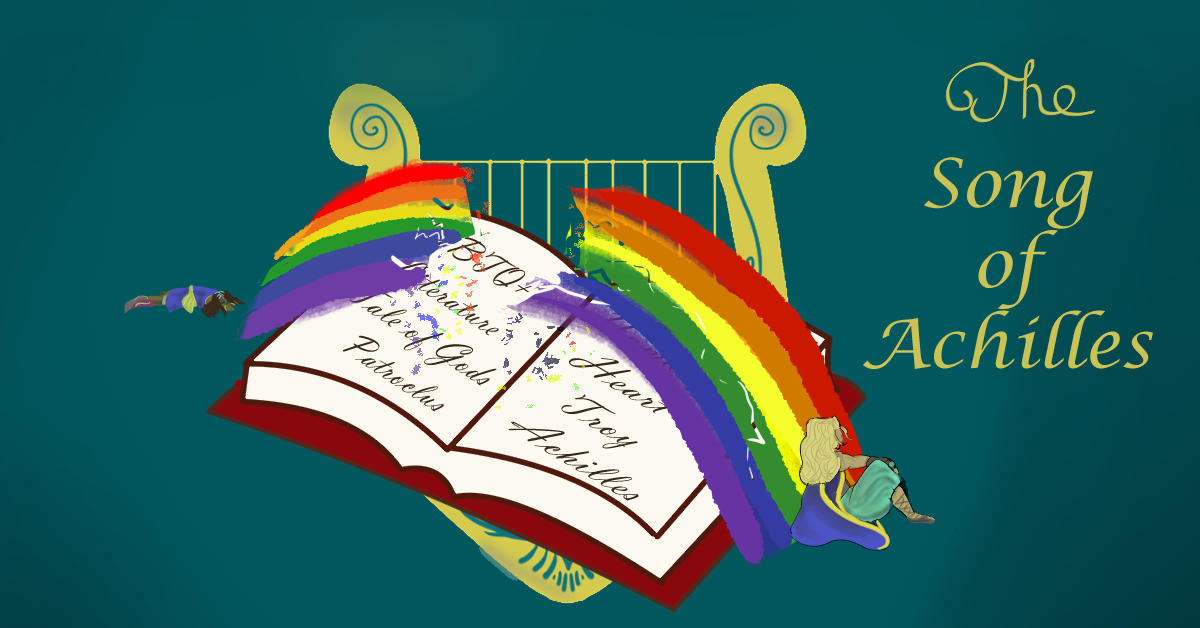How the “female gaze” presents itself in queer literature
Classic literature persists through individuals who revive old works in modern ways. In her novel The Song of Achilles, author Madeline Miller retells the story of Achilles—a Greek warrior—and his lover Patroclus. The story takes inspiration from Homer’s Western classic The Iliad—a legendary epic poem which recounts the events of the Trojan War. Although the The Song of Achilles lacks archeological evidence—when it comes to proving legitimate documentation of the events and individuals in the Trojan War—Miller redirects her artistic attention to the exploration of the two characters.
Throughout the centuries, there have been multiple reinterpretations of The Iliad. However, the versions of this tale that include the relationship between Achilles and Patroclus have always excluded the possibility that they were homosexuals. In The Iliad, it is Achilles’ unspeakable grief and rage—caused by the unjust death of his lover—that turn the tides of the war in favour of the Greeks. In The Song of Achilles, Miller provides a uniquely “female gaze” to the story. In the process, she immortalizes the love of Achilles and Patroclus for generations of readers to come.
Traditionally, the “female gaze” is a manifestation of art which sees women as subjects instead of objects. However, French philosopher Michael Foucault broadens the definition of a “gaze” into an “act of selecting what we consider to be the relevant elements of a total data set available to our senses.” In The Song of Achilles, the blossoming romance of Achilles and Patroclus takes place against the backdrop of a raging, unforgiving war. Woven through the pages of the novel is the continual conflict of rationality with emotion, freedom with fate, and selfish desire with selfless love—all factors that have been added as aspects of the “female gaze.”
It can be hard to understand why or how the “female gaze” is relevant to a homosexual narrative involving two men. In today’s growing culture of toxic masculinity and stigma, Miller’s application of the “female gaze” redefines sexuality, masculinity, and vulnerability. By using the point of view of a patriarchal society, the novel implicates that males are emotionally stifled, unchanging, and should be strict with themselves—in reference to power structures. In The Song of Achilles, Miller strips Achilles’ and Patroclus’s relationship of any standards that describe what sexuality, grief, and love should look and feel like. As a result, the two characters—who get to know each other through an initially anxious friendship—develop their deeply organic, intimate, and oddly liberating romance, despite the confines of their destinies and gender roles.
In each chapter, the “female gaze” emphasizes qualities of softness, emotional fluidity, compassion, and humanity. While Achilles is a quintessential masculine figure who thrives off praise, strength, and extroversion, Patroclus is unable to be a competent soldier. He enjoys practicing medicine in a tent, eating figs, and swimming—activities that, in the novel, lack utility. The politics of the Trojan War reinforce male gender norms, making the connection between Achilles and Patroclus even more important.
Achilles is at times brutish and quick to anger, while Patroclus is sentimental. Only through navigating the harsh waters of their love does Achilles learn gentleness and does Patroclus feel empowered and strong. The Song of Achilles tells its readers that there are many different types of relationships, and in all of them, gentleness and understanding form the foundation of love. In her retelling of The Iliad, I do not think Miller set out to revolutionize queer literature. Instead, she provides a different perspective on two characters whose mystique captivates audiences to this day.
Opinion Editor (Volume 51); Associate Opinion Editor (Volume 50) — Mashiyat (Mash) is a third-year student studying Neuroscience and Professional Writing and Communication (PWC). As this year’s Opinion Editor, Mash hopes to use her writing, editorial, and leadership skills in supporting student journalism in the essential role it plays in fostering intellectual freedom and artistic expression on campuses. When she’s not writing or slaving away at school, Mash uses her free time cooking cultural dishes, striking up conversations with strangers, and being anxious about her nebulous career plans. You can connect with Mash on her LinkedIn.


